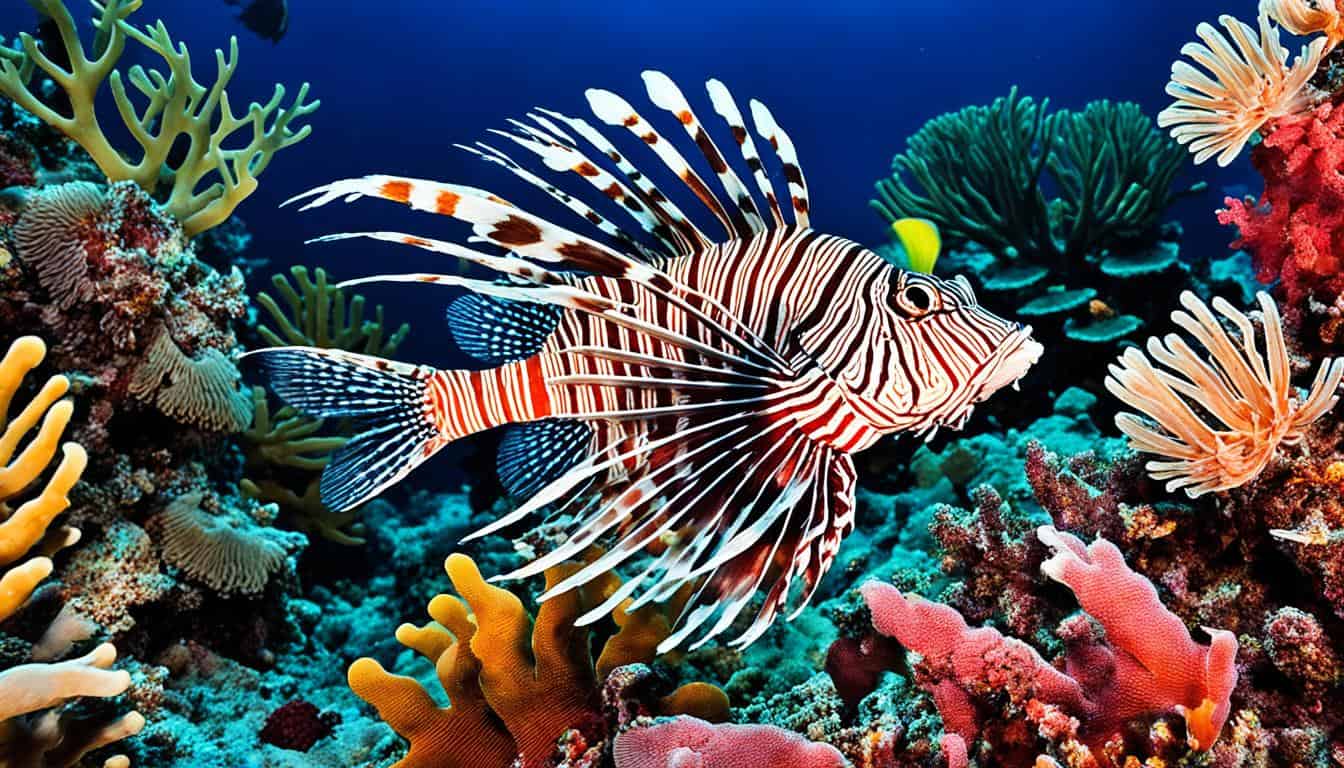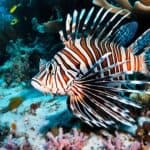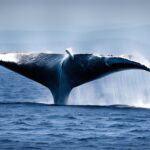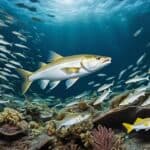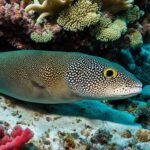The lionfish, from the Indo-Pacific, entered Atlantic waters in the mid-1980s. Its bright colors and venomous spines make it stand out. But, its impact on coral reefs is a big concern. Let’s explore how lionfish affect coral reefs and the problems they cause.
Lionfish eat a lot of native fish, which upsets the balance in the reef. This can harm the health of the reef and its inhabitants. The lionfish’s actions show how one species can hurt marine life and its home.
Lionfish Invasion: An Overview
The lionfish invasion of coral reefs started in the mid-1980s. It’s a big environmental issue. Knowing why lionfish spread is key to understanding the problems in marine ecosystems today.
Brief History of Lionfish in Atlantic Waters
Lionfish first showed up off Florida in the mid-1980s. They were seen as pretty fish for aquariums. But, they turned into a problem over time.
In the past 15 years, their numbers have grown fast. This is because they adapt well to different marine places. Now, they are overpopulating coral reefs.
Causes for the Spread of Lionfish
Several things help lionfish spread. Key reasons include:
- Aquarium releases where people stop caring for them
- No natural predators in Atlantic waters
- Ability to live in many places, like coral reefs, wrecks, and estuaries
These factors let lionfish take over the Atlantic. It makes the problem worse.
Current Distribution of Lionfish
Lionfish are now found all over the Atlantic Ocean, the Gulf of Mexico, and the Caribbean Sea. They are a big threat to native fish and coral reefs. Their numbers keep going up, especially in the Gulf of Mexico.
| Region | Current Status | Impact Level |
|---|---|---|
| Atlantic Ocean | Widespread | High |
| Gulf of Mexico | Rapidly increasing | Critical |
| Caribbean Sea | Establishing dominance | High |
How do lionfish impact coral reefs?
Lionfish in coral reefs cause big worries about their hunting and how they affect native fish. It’s key to know how they change these delicate places.
Predatory Behavior and Diet of Lionfish
Adult lionfish hunt aggressively. They eat many small fish that are crucial for coral reefs. A single lionfish can cut native reef fish numbers by up to 79%. They eat fish that local predators like snappers and groupers would normally eat, upsetting the balance.
Effect on Native Fish Populations
Lionfish growing fast means fewer native fish. Their hunting pushes many species towards extinction, making things worse for overfishing and climate change. This harms not just individual species but also the whole reef community. Lionfish threaten the variety of life in reefs, putting native fish in danger.
Lionfish Effects on Coral Reef Ecosystems
Lionfish have invaded coral reefs, causing big problems for the balance of nature. We need to understand how lionfish affect coral reefs. This includes looking at how they impact herbivorous fish, coral health, and the whole ecosystem.
Impact on Herbivorous Fish
Lionfish eat important fish that keep algae in check on coral reefs. Without these fish, algae can grow too much. This harms coral and hurts the homes of many sea creatures.
Consequences for Coral Health
Too much algae hurts coral health. Reefs change from being mostly coral to mostly algae. This lowers the number of different sea life. Corals then can’t handle stress well, making reefs more likely to get worse.
Overall Ecosystem Imbalance
Lionfish eating habits throw off the balance in the ocean. Fish and coral are trying to adjust to lionfish but it’s hard. Pollution and climate change make things worse. We need to understand these problems to help reefs.
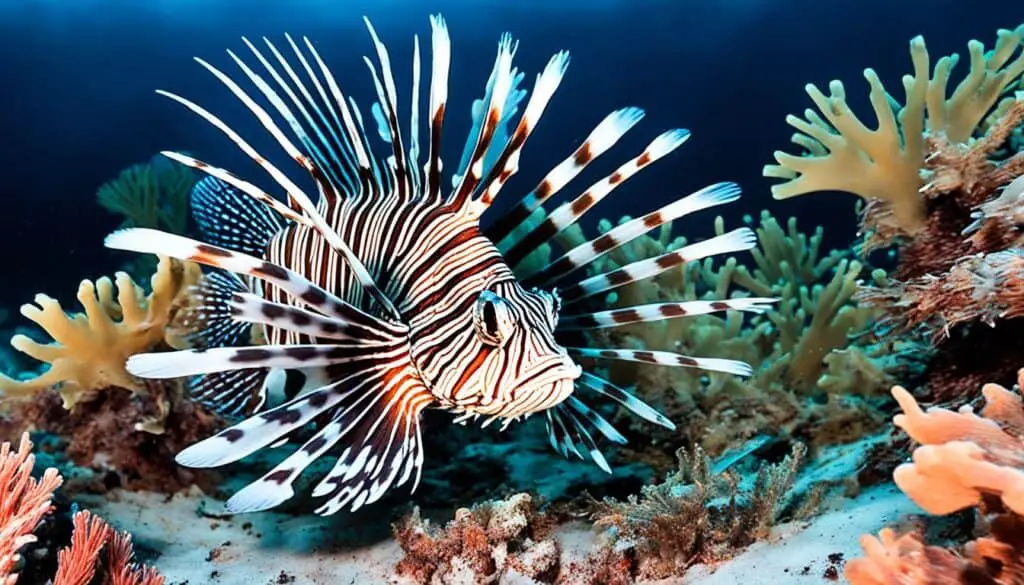
| Aspect | Lionfish Effect | Long-term Consequences |
|---|---|---|
| Herbivorous Fish | Reduction in critical species | Increased algal growth |
| Coral Health | Shift to algal-dominated reefs | Decreased biodiversity |
| Ecosystem Balance | Predation pressure | Struggling fish and coral populations |
Lionfish Predation and Coral Reef Destruction
The lionfish invasion in the Atlantic is a big threat to the coral reef ecosystem. These predators are taking over, harming native species and coral health. Marine biologists and ecologists are very worried.
Case Studies of Reef Damage
Studies in the Caribbean and Atlantic show a big problem. Lionfish have led to a huge drop in native fish, with some areas losing over 80%. Their hunting habits are changing the balance in these ecosystems. We need to act fast to stop them.
Long-term Predictions for Coral Reefs
The future of coral reefs is at risk. If lionfish keep growing, we might lose a lot of species. Experts think we could lose important habitats as native fish and coral can’t compete with lionfish. We need good plans to save these ecosystems.
Economic Impacts of Lionfish Invasion
Lionfish in Atlantic waters are causing big economic problems, especially for local fisheries. They eat many important fish like snapper and grouper, which hurts the fishing industry. This means less fish for fishermen and big losses for those who depend on fishing for their income.
The fight against lionfish shows how they affect local fishing, putting a lot of pressure on fishing communities.
Impact on Local Fisheries
Local fisheries are in trouble because of the lionfish. Fishermen can’t meet the demand for fish, which lowers their income and causes economic problems. This leads to higher prices for fish and affects the fishing industry’s supply chain.
This issue affects local economies a lot, showing the need for quick action against lionfish.
Consequences for Coastal Communities
Coastal communities rely on fishing for their economy and way of life. The rise of lionfish is causing big economic troubles. Families, businesses, and markets are struggling as fish becomes scarce.
This could lead to job losses and less money in these communities. Finding a balance between saving the environment and keeping the economy strong is crucial. Working together is key to solving the lionfish problem and protecting both nature and local economies.
FAQ
How do lionfish affect coral reefs?
Lionfish eat many native fish on coral reefs. This reduces the fish populations. It makes the reef ecosystem unstable, causing more algae to grow and harming coral health.
What is the history of lionfish in the Atlantic?
Lionfish first showed up in Atlantic waters off Florida in the mid-1980s. They came from aquarium releases. Now, they are a big problem for marine life.
What causes the spread of lionfish?
Lionfish spread because people released them from aquariums and they have no natural enemies in the Atlantic. They can live in many types of water, making them hard to stop.
What is the current distribution of lionfish?
Now, lionfish live all over the Atlantic Ocean, Gulf of Mexico, and Caribbean Sea. They’re especially harmful in the Gulf of Mexico, where they threaten native fish.
How does lionfish predation affect native fish populations?
Lionfish eat a lot of native reef fish, sometimes up to 79% less. This hurts the fish populations a lot, making the reef ecosystem unstable.
What impact do lionfish have on herbivorous fish?
Lionfish eat herbivorous fish, which are important for keeping algae in check on coral reefs. Without these fish, algae can take over, hurting coral and other sea life.
What are the consequences of lionfish on coral health?
More algae growing means a shift from coral to algae on reefs. This lowers the reef’s biodiversity and makes it less resilient.
Can you provide case studies of reef damage caused by lionfish?
Studies show that where lionfish are more common, native fish and coral health drop a lot. In some places, fish populations have fallen by over 80% because of lionfish.
What are the long-term predictions for coral reefs affected by lionfish?
If lionfish keep growing, coral reefs in the Atlantic could face big problems. This could lead to a loss of native fish and coral species, and a drop in biodiversity.
How does the lionfish invasion impact local fisheries?
The lionfish invasion hurts local fisheries by reducing the number of important fish. This means less fish to catch and less money for fishermen.
What are the broader consequences for coastal communities?
Coastal communities that depend on fishing face economic troubles as fish populations go down. This affects local markets and shows the need for a balance between protecting nature and making money.

